Your senators and congressional representatives want to hear their constituents. They have fairly specific channels they use to estimate the weight of opinion from residents of their districts: 1) phone calls, 2) visits to district/national office(s), 3) letters, and 4) local meetings. The last is getting harder to read. Bet on the former.
Here’s the plan:
- Identify your legislators and their contact information at whoismyrepresentative.com
- Call when you have time to be on hold.
- While you are waiting, Google the address of the district office for each of your legislators. The website above has DC addresses which are slightly less potent.
- Have your talking points ready (see below). However recognize that you may not get to them in if staff are counting calls by content, a process similar to a yeah or nay poll.
Draft your letters with a similar script:
Who you are:
I am in my third year on faculty at [Important University in Your State]. (Of course I don’t officially represent the university and am sharing my personal views.)
What you study, in plain language:
I study what makes some people much less likely than others to get Alzheimer’s disease using genetics and brain imaging like MRI. We aim to find an approach to prevention.
Current relationship to NIH:
I have an NIH early career award. The federal government has already invested more than $350,000 in helping launch my career and my research team has made breakthroughs.
Remind the staffer that funding is based on merit:
Fewer than one in three scientists who apply receive these awards. I say that to emphasize that researchers do compete to get their research funded.
State what reduction in funding could mean for you and/or your institution:
In the next step of my career, I am currently facing 1 in 5 odds that my NIH proposals will be funded. Less available funding could make this challenge unwinnable for me and for my colleagues.
Closer (your take home message with passion):
The loss of investment in great science and promising investigators will be stunning if the NIH budget is cut.
Offer to stay in touch (scientists on the record are hard to find):
Please feel free to contact me if you need specific stories to make this point.
Email volume is overwhelming and most legislative offices do not have enough staff to sort out signal from noise. Ditto Facebook, Twitter, etc. Even if the legislator has a social media presence, the staff work primarily to control flaming and don’t use comments or messages as data about their base.
In contrast, calls and letters are logged and that makes them potent. Block off time on your calendar for calls as it gets closer to the active consideration of the NIH budget and make those calls. Scientists are making a difference.
